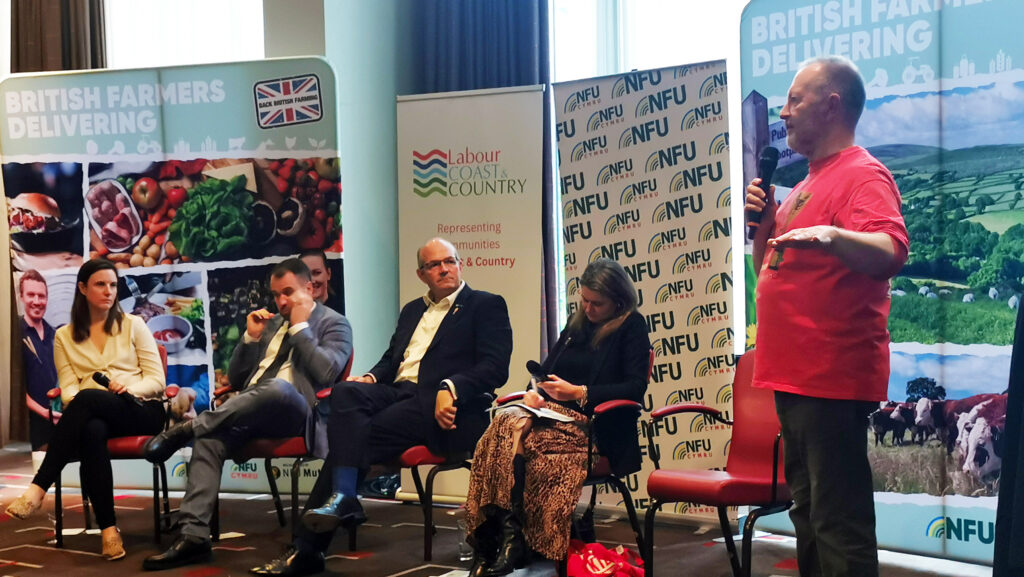Labour MPs challenged to deliver on rural policy pledges
 Hywel Lloyd asks questions at the Labour C&C fringe event in Liverpool © MAG/Phil Case
Hywel Lloyd asks questions at the Labour C&C fringe event in Liverpool © MAG/Phil Case NFU president Tom Bradshaw called for a “grown-up conversation” on inheritance tax and warned of the urgent need to prioritise domestic food production, during a Labour Party conference fringe event focused on rural growth.
Mr Bradshaw was speaking on Monday (29 September) at Labour Coast & Country’s Great British Countryside: Driving Rural Growth panel at the Hilton Hotel in Liverpool, alongside Labour MPs representing coastal and countryside constituencies.
Hosted by Hywel Lloyd, co-founder of Labour Coast & Country, the discussion ranged from food security to investment, rural transport, connectivity, and the next generation and future of family farms.
See also: Analysis: Starmer’s farming promises: What has been delivered?
Referring directly to the Labour government’s controversial proposals to impose a 20% tax on inherited agricultural assets worth more than £1m from April 2026, Mr Bradshaw said: “What happened in October [the Autumn Budget] was done to farming, without engagement, without understanding and without clear purpose.”
He called on Labour to work with the farming sector to find practical solutions.
“If the purpose is: how do we create a transition so that people can pass down their farms at an earlier age, let’s have a grown-up conversation about how we facilitate that.”
Food security dominates
Food security dominated the debate, with Mr Bradshaw questioning where farming currently sits in terms of national policy priorities.
“Unless [food production] becomes a government priority, then it’s always going to be the poor relation… We haven’t seen policies that flow from the Labour manifesto line that food security is national security.”
He added: “We [farmers] are involved in everyone’s lives every day… but that link is completely taken for granted.”
The panel – which included Labour MPs Jayne Kirkham (Falmouth and Truro), Jess Asato (Lowestoft), Sean Woodcock (Banbury), and later Maya Ellis (Ribble Valley) – each stressed Labour’s commitment to rebuilding trust with rural communities.
Labour now represents 157 rural and coastal seats, with 130 of them gained in the July 2024 election.
Ms Kirkham, who is also a member of the cross-party Environment Food and Rural Affairs (Efra) select committee, acknowledged the challenges.
She said: “We don’t produce nearly half of our food… So there is a lot of work to do.”
She also stressed that although strategies are in place, including a Land Use Framework and forthcoming farming strategy, much more is needed to turn ambition into reality.
Mr Bradshaw addressed concerns about the next generation of farmers who will produce the nation’s food, adding that they must be given a sense of purpose.
“Unless we can create the excitement and the belief about the future opportunity, we are not going to attract that next generation… We’ve got to set a direction and go there together.”
Focus on diversification
The role of family farms and diversification was another focus.
Jess Asato said: “What is key and will continue to be key now is diversification… farm shops, weddings… capitalising on the changing landscape is essential.”
But Mr Bradshaw cautioned: “Diversification should be the icing on the cake, and the cake should be food production.
“All too often, we are subsidising food production from the diversification to the point that food production is not worthwhile.”
However, he closed the session on an optimistic note, praising recent conversations with Labour MPs and the formation of the Labour Rural Research Group (LRRG) in August.
“Those conversations have given me real belief that we can turn this corner… I’m not going to tell you that things are going to change, but they could change – and that gives me renewed purpose.”
